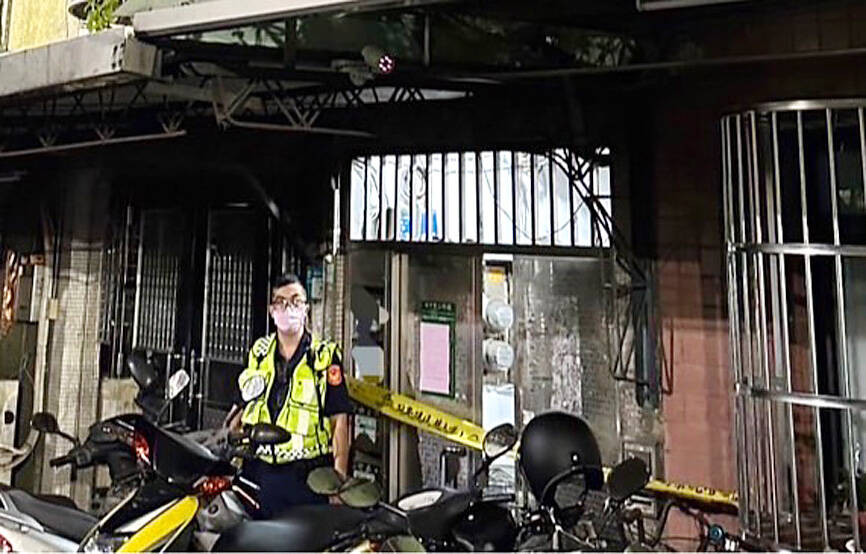The New Taipei City District Court yesterday approved prosecutors’ request to detain a 63-year-old woman on suspicion of murdering her husband by allegedly slashing his throat.
Police quoted the woman, surnamed Chi (季), as saying that she and her 72-year-old husband originally lived in Hsinchu, but later moved to New Taipei City’s Sanchong District (三重).
The woman said in an affidavit that her husband had beaten her after drinking alcohol on Tuesday, and she allegedly used a knife to slit his throat and stab him in the chest five times at about 1am on Wednesday.

Photo copied by Hsu Sheng-lun, Taipei Times
She then called the police an hour later to turn herself in, it said.
Over the 30 years that Chi had been married to her husband, she had reported domestic abuse 10 times — six times in Hsinchu and four times in New Taipei City, police records showed.
She had rejected filing a restraining order against her husband until the latest incident a month ago, police said.
Chi’s son and daughter had for years asked her to relocate or to live separately from her husband, but Chi reportedly declined because she feared “losing face,” and believed that family matters should stay within the family, the police report said.
When giving her affidavit, Chi said she committed the act because she could no longer take the abuse.
Chi’s daughter told police that she had witnessed her mother being domestically abused for many years, and that she had been diagnosed with depression because of the incidents.
Additional reporting by Wang Ting-chuan

A group of Taiwanese-American and Tibetan-American students at Harvard University on Saturday disrupted Chinese Ambassador to the US Xie Feng’s (謝鋒) speech at the school, accusing him of being responsible for numerous human rights violations. Four students — two Taiwanese Americans and two from Tibet — held up banners inside a conference hall where Xie was delivering a speech at the opening ceremony of the Harvard Kennedy School China Conference 2024. In a video clip provided by the Coalition of Students Resisting the CCP (Chinese Communist Party), Taiwanese-American Cosette Wu (吳亭樺) and Tibetan-American Tsering Yangchen are seen holding banners that together read:

UNAWARE: Many people sit for long hours every day and eat unhealthy foods, putting them at greater risk of developing one of the ‘three highs,’ an expert said More than 30 percent of adults aged 40 or older who underwent a government-funded health exam were unaware they had at least one of the “three highs” — high blood pressure, high blood lipids or high blood sugar, the Health Promotion Administration (HPA) said yesterday. Among adults aged 40 or older who said they did not have any of the “three highs” before taking the health exam, more than 30 percent were found to have at least one of them, Adult Preventive Health Examination Service data from 2022 showed. People with long-term medical conditions such as hypertension or diabetes usually do not

POLICE INVESTIGATING: A man said he quit his job as a nurse at Taipei Tzu Chi Hospital as he had been ‘disgusted’ by the behavior of his colleagues A man yesterday morning wrote online that he had witnessed nurses taking photographs and touching anesthetized patients inappropriately in Taipei Tzu Chi Hospital’s operating theaters. The man surnamed Huang (黃) wrote on the Professional Technology Temple bulletin board that during his six-month stint as a nurse at the hospital, he had seen nurses taking pictures of patients, including of their private parts, after they were anesthetized. Some nurses had also touched patients inappropriately and children were among those photographed, he said. Huang said this “disgusted” him “so much” that “he felt the need to reveal these unethical acts in the operating theater

Heat advisories were in effect for nine administrative regions yesterday afternoon as warm southwesterly winds pushed temperatures above 38°C in parts of southern Taiwan, the Central Weather Administration (CWA) said. As of 3:30pm yesterday, Tainan’s Yujing District (玉井) had recorded the day’s highest temperature of 39.7°C, though the measurement will not be included in Taiwan’s official heat records since Yujing is an automatic rather than manually operated weather station, the CWA said. Highs recorded in other areas were 38.7°C in Kaohsiung’s Neimen District (內門), 38.2°C in Chiayi City and 38.1°C in Pingtung’s Sandimen Township (三地門), CWA data showed. The spell of scorching